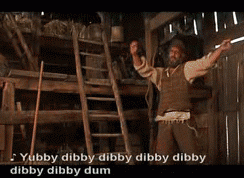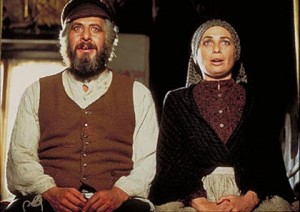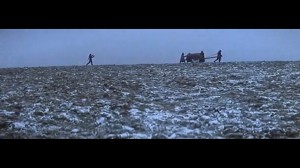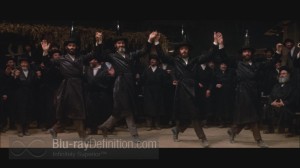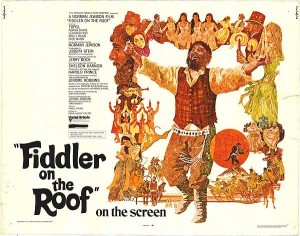100 Film Favorites – #61: Fiddler on the Roof
(Norman Jewison, 1971)
 “Here in Anatevka, you might say every one of us is a fiddler on the roof, trying to scratch out a pleasant, simple tune…without breaking his neck. You may ask, why do we stay up there, if it’s so dangerous? Well, we stay because Anatevka is our home. And how do we keep our balance? That, I can tell you in one word: Tradition!”
“Here in Anatevka, you might say every one of us is a fiddler on the roof, trying to scratch out a pleasant, simple tune…without breaking his neck. You may ask, why do we stay up there, if it’s so dangerous? Well, we stay because Anatevka is our home. And how do we keep our balance? That, I can tell you in one word: Tradition!”
Today’s entry in our Countdown (the 40th so far) is the 1971 film adaptation of Fiddler on the Roof, the 1964 Broadway musical by Jerry Bock and Sheldon Harnick. The musical in turn was based on works by Yiddish storyteller Sholem Aleichem.
The film (like the musical, and the original short stories) focuses on the misadventures of Tevye, an Orthodox Jewish milkman living in the small Russian village of Anatevka in 1905. Tevye does what he can to uphold tradition as his daughters marry and leave home, and his community and the nation beyond stand on the brink of great social change.
Among the many traditions followed staunchly by the villagers is the arrangement of marriages via matchmaker. Early in the film, Tevye is pleased to learn that the town matchmaker has “matched” his eldest daughter with Lazar Wolf, a wealthy butcher (despite being slightly taken aback, as Lazar Wolf is slightly older than Tevye himself). Tzeitel, however, is vehemently opposed to the idea and begs her father to renege on his agreement with the butcher. I don’t really understand what she has to complain about, though. I mean, isn’t a rich guy with a name like a StarFox villain every girl’s ideal husband? Regardless, Tzeitel tells her father than she and her childhood sweetheart, the town’s meek (and virtually penniless) tailor, have “made each other a pledge” that they will be married. After some hesitation, Tevye consents to the alternative arrangement. He convinces his wife by telling her he was warned by ancestral ghosts in a dream that Tzeitel must marry the tailor, or suffer retribution from beyond the grave at the hands of Lazar Wolf’s dead wife.
As Tevye strains to keep his family together while still adhering to tradition, broader social forces are at work in the community. At Tzeitel’s wedding to the tailor, a pogrom erupts, carried out by the local Orthodox Christian authorities, which results in extensive damage to Jewish property.
Things gradually return to near-normalcy, but soon Tevye’s second daughter, Hodel, has fallen for a “radical,” a student of Marxism eager to play a role in the upcoming revolution. At a demonstration, the young man is arrested and summarily exiled to Siberia. Hodel declares that she intends to journey to Siberia and marry him there, with or without her father’s blessing. Acknowledging the love between the two, Tevye grants his blessing, despite the student’s views being anything but “traditional.” Returning home, Tevye remarks to Golde, his wife of 25 years, that “it’s a new world,” and young people are now beginning to make decisions based on love rather than tradition. Reflecting on their own marriage (arranged by a matchmaker), Golde and Tevye determine that they nevertheless do authentically love one another.
This slightly more flexible understanding of tradition seems to be working well for Tevye…until his third daughter, Chava, wishes to marry a Russian Orthodox Christian man. The notion is anathema to Tevye, as marrying outside the faith is considered among the most severe taboos. He considers the idea only briefly, before declaring that he can only bend so far before he breaks. He disowns Chava and her goy boy toy, and sadly trudges home.
Soon thereafter, word comes from the authorities that the Jews will be forced to evacuate Anatevka. The villagers make plans to travel to new homes all over the world, with Tevye, Golde, and their two youngest daughters intending to move to New York. Chava comes to assure her family that she and her new husband will be moving as well, unable to live among people who practice such persecution. Though unable to face her directly, Tevye mutters a blessing for her under his breath. As the Jewish community pulls up its stakes and prepares to hit the road, Tevye gestures to the fiddler, a spectral figure who has served throughout the film as a metaphor for the villagers’ traditions, to join them. Though the Jews are scattered far from their homes and each other, their traditions will nevertheless travel with them.
Much of my attachment to this film stems from the fact that I listened to the soundtrack (copied onto a cassette tape from an older 8-Track version) nearly every day when I was in first grade. It’s great music, but also one of the only cassettes I had. In fact, it, the Phantom of the Opera soundtrack, a set of American folk-song tapes, and a compendium of music from throughout the history of the Disney studio made up roughly 98 percent of everything I listened to, and all left a lasting impression on me.
Maybe you want a more nuanced critical opinion than simply “I listened to the music a lot when I was six.” Well, here goes: The film presents the largely bleak story of Jewish persecution in Eastern Europe without losing a sense of heart and humor. It’s a stirring, memorable musical, with a message more focused on the dogged perseverance of a people, rather than on a specific gloomy moment in their history.
Tidbits: One of famed film composer John Williams’ first major jobs in Hollywood was arranging and adapting the Fiddler Broadway score for the movie. For his work, Williams received his first Oscar.
-Williams’ award was just one of three Academy Awards won by the film (it also won for Best Sound and Best Cinematography). It also received nominations for Best Picture, Best Actor (for Topol as Tevye), and Best Supporting Actor (for the role of Motel, the tailor). Fiddler came at the tail end of an era in which film musicals had received wide financial success and critical acclaim (with West Side Story, My Fair Lady, The Sound of Music, and Oliver! all taking Best Picture during the 1960s). Perhaps if it had come out a year or two earlier, it might have made good on that Best Picture nomination.
—
Brian Terrill is the host of television show Count Gauntly’s Horrors from the Public Domain. You can keep up with Brian’s 100 Film Favorites countdown here.



